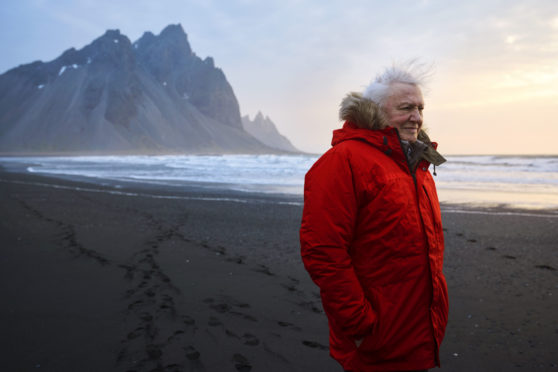
Sir David Attenborough has spoken of the “tragic, desperate mess” human beings have made of the planet as he prepares to air his new natural history series.
Seven Worlds, One Planet, which has been four years in the making, features wildlife firsts and has already been snapped up around the globe.
It breaks with the tradition of previous BBC Studios’ Natural History Unit programmes – putting a conservation message “at the heart” of each episode, instead of being tagged on at the end.
Producers took drones over “volcanoes, waterfalls, icebergs and underground into caves” to shoot heart-wrenching “animal dramas”.
Dramatic scenes include a lone, grey-headed albatross chick in Antarctica being blown off its nest as a result of increasingly intense storms in the region.
Speaking at the launch of the BBC One series, Sir David, who presents the programme, said: “We are now universal, our influence is everywhere.
“We have it in our hands, and we made a tragic, desperate mess of it so far.
“But, at last, nations are coming together and recognising that we all live on the same planet… and we are dependent on it for every mouthful of food we eat and every breath of air we take.”
Asked what we can do to save the planet, Sir David, 93, said: “The best motto… is not to waste things.
“Don’t waste electricity, don’t waste paper, don’t waste food – live the way you want to live, but just don’t waste.”
The broadcaster said: “Look after the natural world, the animals in it and the plants in it too. This is their planet as well as ours. Don’t waste.”
The seven-part series, to air later this month, reveals “new species and behaviours”.
Highlights include “a new species of jumping spider, in Australia, with dance moves that need to be seen to be believed”, and “the most extraordinary gigantic gathering of great whales” in Antarctica.
BBC director-general Lord Tony Hall said there had “never been a more important time to bring nature’s wonders to everybody”.
He said: “This series has conservation at its heart. Each one of the seven episodes takes on some of the major threats facing the world today. ”
Sir David said he was perceived as a “crank” when he, and the Natural History Unit, began broadcasting messages about caring for the natural world.
“But as it’s gone on, and we’ve repeated it on and on and on – not wasting things, not polluting things – then suddenly, for no reason that I can understand… suddenly you hit the right note,” the naturalist said.
Blue Planet II raised awareness around the world of the environmental damage caused by plastic pollution.
“We don’t understand how it happens but with Blue Planet II, suddenly the world was electrified about the crime of chucking plastic into the ocean that can throttle creatures, that can poison creatures, including ourselves,” Sir David said.
The programme, the result of 92 film shoots in over 40 countries, features “grave-robbing hamsters in Austria” and polar bears in a never-before-seen hunting strategy to catch beluga whales.
Antarctica, North America, South America, Europe, Africa, Asia and Australia will feature over different episodes in the series.
Seven Worlds, One Planet begins on Sunday October 27 at 6.15pm on BBC One.

Enjoy the convenience of having The Sunday Post delivered as a digital ePaper straight to your smartphone, tablet or computer.
Subscribe for only £5.49 a month and enjoy all the benefits of the printed paper as a digital replica.
Subscribe